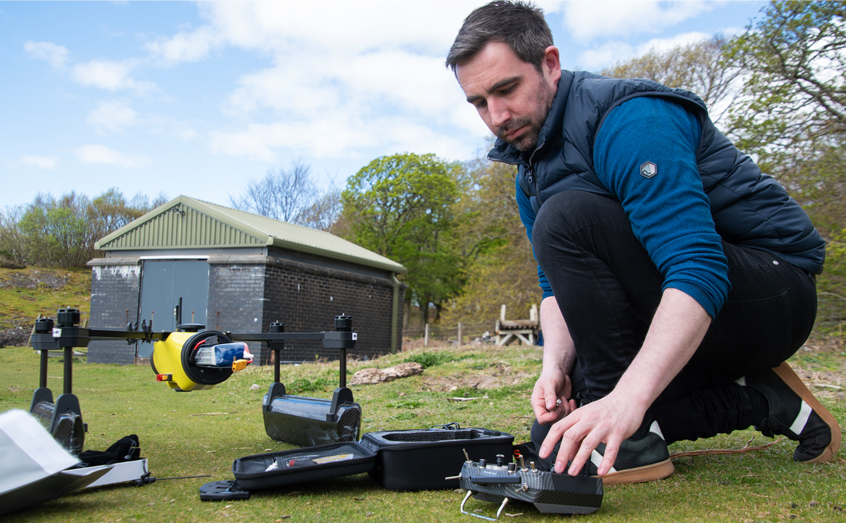SAMS news room
UK can become leader in environmental monitoring

Robotics scientists who say the UK could become a global leader in environmental monitoring by embracing technology already available have launched a new course to train others.
The Scientific Robotics Academy, based at the Scottish Association for Marine Science (SAMS) in Oban and part-funded by the UK government through the UK Shared Prosperity Fund, will demonstrate the capabilities of a range of robotics systems during its training course between 3rd – 5th September.
The course, Environmental Monitoring using Multi-Platform Technology, is designed to benefit those with a responsibility for environmental monitoring, including landowners, planners, NGOs and third sector organisations and researchers.
SAMS robotics lead Dr Phil Anderson said: “Scotland, and the wider UK is ideally placed, in terms of location and technology readiness, to become the global leader in environmental monitoring.
“The Scientific Robotics Academy is pioneering marine robotics education and innovation to prepare the next generation of users of autonomous platforms. We also exist to engage current engineers in conversations about robotics platform and sensor needs and challenges of the marine science and environmental management community.
“On the course, users will learn about the preparation and application of robotic platforms and sensor technology to monitor and manage rapidly changing environments. The way we monitor the environment is changing too and we want to make sure the people with this very important role have the skills they need.”
The hands-on training will be delivered by experts in their field and provide a comprehensive overview of environmental monitoring spanning terrestrial, coastal and marine activities.
The course will cover practical elements from mission planning and legislative requirements to sensor types and data processing.
Argyll and Bute Council has supported the development of the Scientific Robotics Academy through access to the Shared Prosperity Fund.
Councillor Math Campbell-Sturgess, Argyll and Bute Council’s Policy Lead for Business Development, said: "UKSPF funding has been invaluable in enabling us to deliver additional support for local businesses, people and skills and further investment in our communities.
“Argyll and Bute is ideally located to position Scotland as a pioneering force for innovation through robotics testing and training. Innovation partnerships, such as Limosaero's visit to SAMS to test sensors on their solar powered drone at Oban Airport, has further demonstrated the growing capability of technology to improve connectivity with remote island communities, and deliver time- and cost-savings for users.
“Bridging the gap between those that develop these advancing technologies and the end users has never been more important, and the robotics academy is the perfect enabler.”
The three-day course, Environmental Monitoring using Multi-Platform Technology, has been CPD-recognised by IMarEST – the Institute of Marine Engineering, Science and Technology.
For more information on the upcoming course and to apply for a place, see: Courses — Scottish Association for Marine Science, Oban UK
As well as offering additional person discounts for multiple places purchased, thanks to the generous support of BlueFloat Energy | Nadara Partnership, there are also six part-sponsored places on the course. Details for this can also be found on the course webpage (https://www.sams.ac.uk/robotics/academy/sponsored-places/).
